The second starts with a wall of water: hundreds of gallons a second tumbling 15 feet off the lip of a 30-foot wide concrete shelf. I stepped in a few feet from the torrent and swam into it completely submerged. Late afternoon sunlight slanted into the water suffusing it a bright creamsicle blue. Under the cascade billions of exploding bubbles bobbled itty-bitty to the surface and there, barely beyond the effervescence, hovered thousands of tiny fish. Watching me. Treading water. Doing fish things. Like nibbling at my feet. I hovered there beneath the surface, goggling at the wildlife and resurfacing sparingly, until my lungs couldn't take any more, and then I swam the length of that pool. It's strange to swim among fish, to watch them dart away from your hands as you cut through the water.
Dairy King Live
An hour later, at Kibbutz Sheluhot, a religious farming collective, I communed with young dairy cows, who are so hungry they'll suck on anything, including hands ...
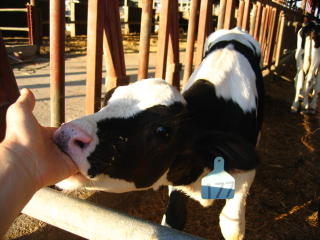
thanks to early separation from their working moms.
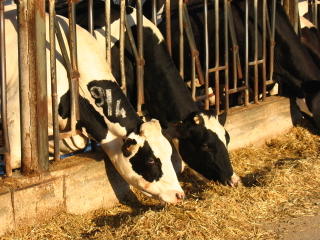
As one calf slimed my hand most grievously, I felt his rough tongue and new molars. Very strange. A lot of suction. The younger calves were very friendly, kind of like big dogs (which is what cloistered urbanites always say).
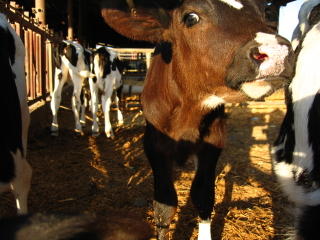
The next age group up had already learned fear -- probably when the numbers were seared onto their backs -- but curiosity eventually overcame apprehension, and some realized they liked having their knobby heads scratched.
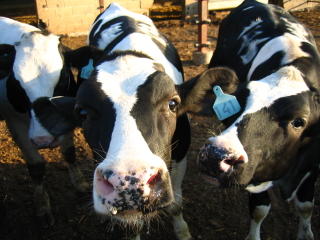
What I learned about calves from my uncle Jack, who used to work in the dairy: From three days on, the calves have unlimited access to grain and hay but only see their moms three times a day -- after the automatic milking machines have extracted 30-40 liters of milk (each day). Within a short time they stop getting real milk and are put on formula. Other dairy trivia: barcodes on the cows' hooves help track their productivity and even consumption.
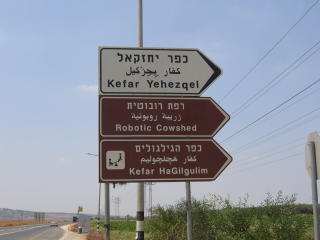
Israel has one "Robotic Cowshed," which allows cows to disgorge their udders at will. Robot-milked cows generally come in for milking five times a day, which makes them more productive and theoretically more content than cows that have to wait for humans to milk them just three times a day. Robotic cowsheds are popular in Europe.
Temp Solution
The labor situation at kibbutzim has changed radically in the past 10 years, thanks in large part to the Intifadeh, which both scared off the traditionally European and American "summer in Israel" volunteers and led to the rejection of Arab workers, who were deemed an unsafe risk. Now East Asia provides cheap, reliable labor to keep the kibbutzim and old folks' homes and restaurants humming. At Sheluhot, where my aunt and uncle have lived their entire adult lives, a group of Thai men live wholly apart from their employers in a U-shaped cluster of trailers. Imported farm hands. Their presence is symptomatic of the sickness of the kibbutz system, once a powerful and exemplary component of Israel's labor-driven society, now a splintering relic riven by diverse new economic and societal pressures in a country where high-tech has replaced agriculture as the key to a better tomorrow.
Kibbutzim hold little interest for ambitious youth, and so the average age of the kibbutz-dwellers is rising. Theoretically, and this is a wild excursion, in a near future some kibbutzim could be operated by old men and women pushing buttons and barking orders to crews of Asian workers. This is the secular humanist in me going off, but I think the complete segregation of foreign workers from the community's social fabric compounds the sickness of the kibbutz system. I also think turning cows into machines is another form of sickness, but this denaturing is far worse in the U.S., where Mad Cow Disease is nature's revenge.
But the Thai workers probably don't know they're symptomatic of anything beyond globalization, if that. Meanwhile, their employers are very happy with them; my uncle said they're like "robots" -- they really get the job done. I stumbled upon them while photographing a sun-splashed tower of palletts near their trailers.
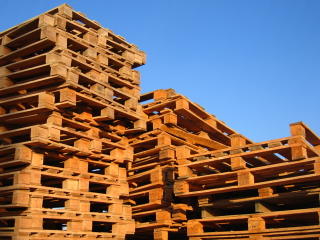
When I tried to approach, they waved me away. I thought to regale them with tales of Hollywood Blvd.'s Thai ex-pats -- well, no, but I was willing to play any card I had for a plate of whatever they had for dinner. But they professed to speak neither English nor Hebrew and just kept waving and smiling and shaking their heads. Sent me surfing out of there on a wave of liberal guilt and frustration. Walking away, I was amazed to see a small but lush patch of Thai greenery, bright with small spiky peppers, spherical striped eggplants, lemongrass, basil, mint, and other herbs, all under the care of a sophisticated combination of drip and spray irrigation (a technology Israel pioneered).
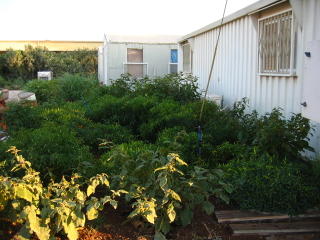
This is where the Thai workers talk to their loved ones back home.
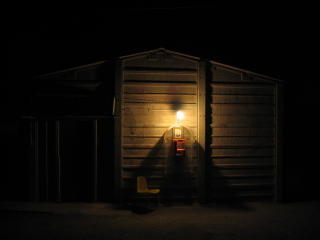
That you can swim with fish in a natural pool just 10 minutes from a place where people and animals have been turned into robots is part of what makes Israel so strange and contradictory. That, and
Arab vs. Jew,
Ashkenazi vs. Sephardi,
Labor vs. Likud,
far left vs. center left
far right vs. center right,
religious vs. secular,
religious vs. ultra-religious,
city vs. country,
North vs. South,
old vs. new,
rich vs. poor,
new rich vs. old rich,
new immigrant vs. old immigrant,
etc.
etc.
etc.
*

No comments:
Post a Comment